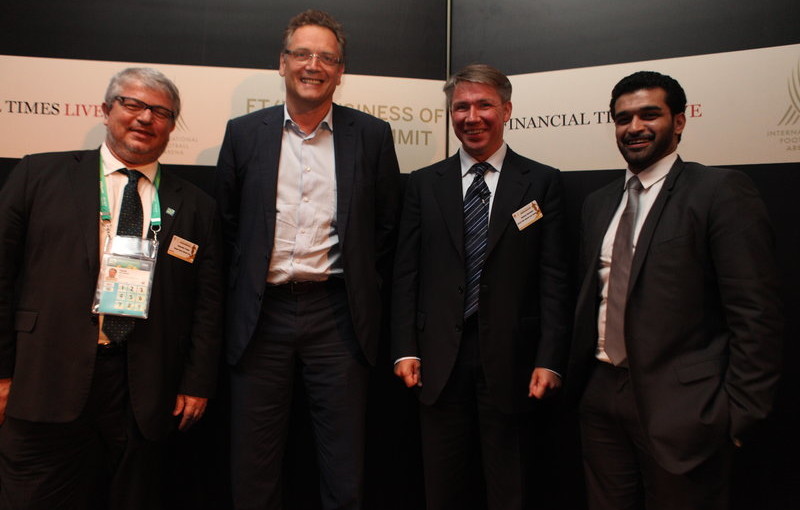By Paul Nicholson in Rio
June 17 – The respective leaders of the next three World Cup organising committees had the rare experience of sharing the same panel on Monday as they described the challenges that lay ahead for Brazil, Russia and Qatar, respectively.
Ricardo Trade, CEO, Brazil 2014 World Cup, Alexey Sorokin, CEO, LOC, Russia 2018, and Hassan al Thawadi, Secretary General, Qatar 2022 Supreme Committee, took centre stage at the FT/IFA Football Business Summit in Rio de Janeiro – with each outlining the various tasks they are having to cope with.
Discussion inevitably covered Brazilian infrastructure build and Russian budget overspend (or not). And, of course nothing seems complete these days without raking over the sand of the Qatar Summer or Winter World Cup debate.
Fascinatingly, an informal vote on when the 2022 World Cup should be staged was put to the audience of around 300 by moderator Roger Blitz, sports editor of the FT. Winter narrowly won but, perhaps reflecting some of the fatigue the topic is now generating, a large majority of delegates, probably about 50 percent, abstained.
Earlier in the day Eduardo Paes, the Mayor of Brazil, said that the World Cup adventure began with a “clear tactical legacy…people say it is only for the World Cup, but when you look at it, it is for the people. It is a great opportunity to make an investment in transport mobility.”
Paes also talked about how important it was for the World Cup to “show Brazil’s assets”, and of “changing culture” though there are undoubtedly a lot more challenges before the tournament kicks off for real in June next year.
Lawyer Marcos Motta reiterated his belief that when it comes to third party player ownership “UEFA have gone beyond the level of their jurisdiction and their competence.”
Motta argues that third party ownership is essential for the financing of clubs in South America. No-one from the continent disagreed with him, but other comments from Europeans throughout the day suggested that they hadn’t fully understood his argument.
Globo executive director Marcelo de Campos Pinto explained why no other broadcaster coming into the Brazilian marketplace could provide the value to rights holders that Globo can with its multiple channels and platforms.
With goalline technology making its debut in official competition at the ongoing Confederations Cup, British Airways and Sports Investment Partners chairman Sir Martin Broughton banged the drum to take that even further, pushing for an increase generally in the use of new technologies in football – chips in boots for offside rulings, limited video reviews of refereeing decisions. But FIFA general secretary Jerome Valcke, not surprisingly, wasn’t too keen on that idea.
And Wisekey CEO Carlos Moreira floated the idea that technology has advanced to the stage that the same World Cup final could be played in 10 different venues in front of 10 different crowds at the same time via the transmission of holograms. Doubtless the ticketing agents were rubbing their hands.
That isn’t Moreira’s business, however. He makes social media apps which he says can generate between one and five dollars per fan per year from fan bases that are emotionally attached to a club but currently don’t spend the money. He has just done a deal with Brazilian giants Flamengo – they have a fan base of 40 million.
Other heavy hitters included Ron Gourlay, CEO of Chelsea, in a rare opportunity to look behind the scenes at one of the world’s biggest clubs. And Aldo Rebelo, Brazil’s sports minister, who was probably relieved to be addressing a football business group rather than the protestors in the streets.
Contact the writer of this story at moc.l1741560386labto1741560386ofdlr1741560386owedi1741560386sni@n1741560386osloh1741560386cin.l1741560386uap1741560386

